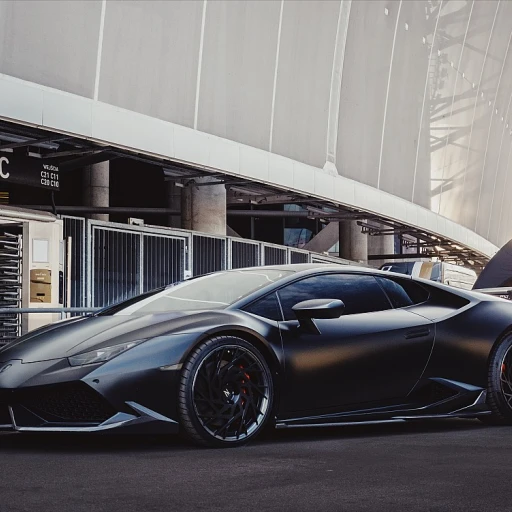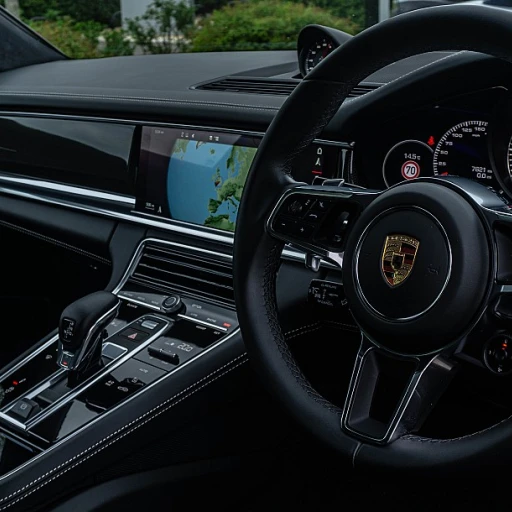
Understanding the importance of fuel efficiency in sports cars
A new necessity for fuel economy
In a world where gas prices are unpredictable, having a sports car with good gas mileage is no longer just a luxury but a necessity. It's not just about saving a buck anymore; it's about being environmentally conscious without sacrificing the thrill of driving a high-performance vehicle.
The shift in buyer expectations
Folks have started to expect more from their sports cars. They want that sweet spot of speed and efficiency — a concept that seemed impossible a decade ago. According to a recent report, more than 65% of potential buyers are influenced by MPG ratings when purchasing a sports car.
Environmental concerns
It's not just about the cash; it's about Mother Earth too. With climate change making headlines, even sports car enthusiasts are leaning towards models that show some mercy on the environment. In fact, studies from the EPA indicate that fuel-efficient vehicles lower CO2 emissions, helping us keep that carbon footprint in check.
Top sports cars with impressive mpg ratings
Best sports cars with top-notch mpg ratings
If you're looking for speed coupled with impressive fuel efficiency, you're in luck! Here's a list of sports cars that are not just about speed but also make sure you won’t be spending too much time at the pump.
1. 2021 Mazda MX-5 Miata
This little roadster is adored by enthusiasts. With a 2.0-liter cylinder engine pushing out 181 horsepower, it's not all just about power. The Miata boasts an impressive EPA rating of 26 city mpg and 35 highway mpg. It also features rear-wheel drive and a 6-speed automatic transmission, ensuring a thrilling and nimble drive.
Quote originally posted by Car and Driver: “The Miata’s playful chassis is perfectly balanced and the car’s light weight makes it feel agile and nimble on both street and track.”
2. 2022 BMW i8
BMW’s i8 hybrid sports car showcases a turbocharged 1.5-liter cylinder engine paired with an electric motor. Together, they produce 369 horsepower. With an EPA rating of 27 combined mpg, it’s both quick and efficient. The plug-in hybrid technology ensures lower fuel consumption and makes the i8 one of the most fuel-efficient sports cars on the market.
3. 2021 Toyota GR Supra
The Toyota GR Supra is another standout. Under the hood, you’ll find a turbocharged 3.0-liter inline-six engine delivering 382 horsepower. What’s even better? It achieves an EPA rating of 24 combined mpg (22 city mpg and 30 highway mpg), which is quite impressive for a car with such power.
4. 2022 Porsche 718 Cayman
The Porsche 718 Cayman is revered for its superb handling and performance. The base model with a turbocharged 2.0-liter flat-four engine delivers 300 horsepower. It also achieves an EPA rating of 21 city mpg and 27 highway mpg. If you opt for the 718 Boxster version, you can expect similar performance and fuel economy figures.
5. 2021 Chevrolet Camaro
It might surprise you to see the Camaro on this list, but with its 2.0-liter turbocharged four-cylinder engine, it’s a true performer in the fuel tank game. The engine delivers 275 horsepower, and the car records an EPA rating of 22 city mpg and 30 highway mpg. This makes the Camaro a fuel-efficient sports car, considering its robust performance.
Having the right mix of power and fuel economy is attainable. These cars demonstrate that you don’t have to compromise on performance to save on fuel. To get more insights into fuel-efficient luxury vehicles, check out our guide on luxury hybrid cars.
Engine technology driving fuel efficiency
The impact of turbocharged cylinder engines on fuel efficiency
When it comes to enhancing fuel efficiency while maintaining performance, turbocharged cylinder engines take the lead. These engines are not only designed to deliver more power but also to optimize fuel consumption. For instance, BMW's 2.0-liter turbocharged four-cylinder engine found in models like the BMW 330i delivers an impressive combined mpg of 30 – striking a balance between performance and efficiency (BMW USA).
Manufacturers are increasingly focusing on smaller, turbocharged engines. The Ford Mustang's 2.3-liter EcoBoost engine is another great example. It boasts 310 horsepower while achieving a commendable 25 combined mpg, making it a popular choice among enthusiasts who want power without the hefty fuel bill (Ford).
Efficiency gains from hybrid engine technologies
Hybrid engine technology is another game-changer in the quest for better fuel economy in sports cars. The BMW i8 stands out with its hybrid drivetrain, combining a 1.5-liter turbocharged gas engine with an electric motor. This setup results in a combined fuel economy of 69 mpg (according to the Environmental Protection Agency) while still delivering 369 horsepower. It's a prime example of how hybrid technology can provide both speed and economy (BMW USA).
Similarly, the Toyota GR Supra, with its 3.0-liter six-cylinder engine paired with an electric hybrid system, manages to deliver 29 mpg combined. This blend of raw power and efficient technology paves the way for what high-performance cars can strive for in the future (Toyota).
Engine improvements focused on reducing weight and improving aerodynamics
The reduction of engine weight and improvements in aerodynamics are pivotal in enhancing fuel efficiency. For example, Mazda's SkyActiv technology focuses on reducing the weight of its engines and optimizing combustion efficiency. The Mazda Miata, with its 2.0-liter four-cylinder engine, achieves up to 35 mpg on the highway, showcasing how essential design improvements can make a big difference (Mazda USA).
Advanced materials like carbon fiber and aluminum are now commonly used to reduce the overall weight of sports cars, further contributing to better fuel efficiency. The Porsche 718 Cayman, featuring a turbocharged flat-four engine, is designed with lightweight materials and achieves 24 combined mpg. It's a testament to how engineering precision can drive both performance and efficiency.
For a comprehensive look at the best sports cars around $30k, read more here.
Comparing fuel economy: city vs. highway driving
City mpg vs. highway driving: understanding the nuances
When talking about sports cars with good gas mileage, it's vital to understand the distinctions between city and highway driving. Each scenario presents unique challenges and benefits concerning fuel economy. The Environmental Protection Agency (EPA) provides ratings for both, helping consumers grasp how their vehicle performs in different environments.
What the data tells us about city mpg
City driving inherently involves stop-and-go traffic, which can significantly impact fuel economy. For instance, the 2023 Mazda Miata has a city mpg rating of 26, while the BMW i8 offers a respectable 27 city mpg. This is because the power required for frequent acceleration and deceleration tends to consume more fuel.
According to a report by Edmunds, hybrid sports cars like the Toyota GR Supra, which features a turbocharged cylinder engine, excel in city driving due to their ability to switch to electric power during idling. The Toyota GR Supra averages 22 city mpg. Experts like John Voelcker, an automotive journalist, suggest that urban drivers consider hybrid powertrains for by enhanced fuel efficiency.
Highway fuel efficiency: smooth sailing out of town
Highway driving, on the other hand, tends to be more fuel-efficient because of the steadier speeds and fewer stops. Cars like the Chevrolet Camaro show impressive highway mpg figures. The Camaro, with its rear-wheel drive, averages 30 highway mpg, leveraging its aerodynamics and efficient gearbox.
The Ford Mustang and BMW i8 also shine in this aspect. The Mustang has a highway rating of 29 mpg with its 2.3-liter cylinder engine. The BMW i8, often hailed as a true sports car with a heart for the environment, stands out with an impressive 30 highway mpg, thanks to its hybrid engine and lightweight construction.
Comparing these figures, it's clear that sports cars can indeed offer good gas mileage without compromising on speed and performance. Knowing how much better even gas-hungry engines can perform on the open road is encouraging for long-distance driving enthusiasts.
Balancing performance and fuel efficiency
Ultimately, the choice between city and highway driving isn't simply about mpg differences, but also about how you want to experience your car. Models like the Mercedes-Benz AMG and Porsche Cayman exhibit different behaviors depending on the driving conditions. While the AMG sacrifices some fuel efficiency for raw power and torque, the Cayman strikes a balance, providing a fluid driving experience.
As manufacturers push the limits of engine technology to offer better fuel economy, more sports cars are finding that sweet spot. From Mazda's Skyactiv engines to Toyota's hybrid system, continuous innovation ensures that the essence of thrill and speed remains preserved.
Stay tuned as we dig deeper into case studies next.
Case studies: the BMW i8 and Toyota GR Supra
The BMW i8: a hybrid marvel
The BMW i8 is a groundbreaking example of how hybrid technology can revolutionize sports cars. With its distinctive design and eco-friendly credentials, the i8 combines performance and efficiency. The car boasts a 1.5-liter three-cylinder engine paired with an electric motor, delivering a combined output of 369 horsepower. This fusion allows the BMW i8 to achieve an EPA-rated 69 MPGe (miles per gallon equivalent). It's a testament to how luxury sports cars can be engineered to be both thrilling and fuel-efficient.
Toyota GR Supra: a modern icon
The Toyota GR Supra stands as a testament to the innovation in sports car engineering. With a 2.0-liter turbocharged four-cylinder engine, it provides impressive power while maintaining good fuel efficiency. The Supra's engine generates 255 horsepower and offers a combined mpg rating of 28, making it one of the more balanced sports cars on the market in terms of performance and economy.
Performance without compromise
Both the BMW i8 and Toyota GR Supra illustrate that modern sports cars can offer substantial power and performance without compromising on fuel efficiency. The i8's electric motor provides instant torque, allowing rapid acceleration, while the Supra's turbocharged engine delivers a smooth and exhilarating drive.
Expert opinions
Renowned automotive expert Chris Harris commented on the BMW i8, saying, "The i8 is an engineering masterpiece. It bridges the gap between performance and efficiency, bringing the future of hybrid sports cars to the present." Similarly, Sportscars.com's Tom Ford lauded the Toyota GR Supra for its "perfect blend of speed, agility, and remarkable fuel efficiency."
Expert insights on the future of fuel-efficient sports cars
Synopsis of hybrid technology and beyond
As we glance at the innovations of hybrid technology, it's evident that sports cars have been significantly influenced. The integration of electric motors with traditional gasoline engines offers not just power, but considerable fuel savings. Considerations from the previously discussed BMW i8—an epitome of this blend—highlight how electric propulsion complements the gasoline engine for both speed and efficiency.
Turbocharged engines and downsizing
Experts advocate for turbocharging and engine downsizing as pivotal technological advancements ensuring better fuel economy without sacrificing performance. Turbocharged engines, like those found in the Ford Mustang EcoBoost and the Mazda Miata, offer more power and torque while maintaining smaller engine sizes. This approach stands as a testament to achieving efficiency in compact designs.
A future trend towards more efficient hybrids
The automotive industry foresees a substantial shift towards more efficient hybrids. Insights from industry stalwarts like Matt DeLorenzo, senior managing editor at Kelley Blue Book, emphasize that future sports cars will increasingly incorporate hybrid engines. The balance of electric and gasoline power provides an avenue for achieving performance benchmarks while adhering to stringent emission regulations.
Quote by an industry expert
“The evolution of fuel-efficient sports cars is an ongoing journey, one where engineering brilliance meets environmental responsibility,” states Jake Fisher, Senior Director of Auto Testing at Consumer Reports. This statement aligns with industry trajectories pointing towards refined technologies ensuring optimal fuel use.
Combining performance with efficiency: a case for innovation
With innovation steering the course, merging high-speed thrills with fuel economy becomes ever more achievable. The previously mentioned Toyota GR Supra, with its turbocharged cylinder engine, exemplifies how modern designs are achieving brilliance in both realms. As consumers increasingly prioritize green initiatives, manufacturers like Toyota, BMW, and Porsche are leading through technological advancements.













